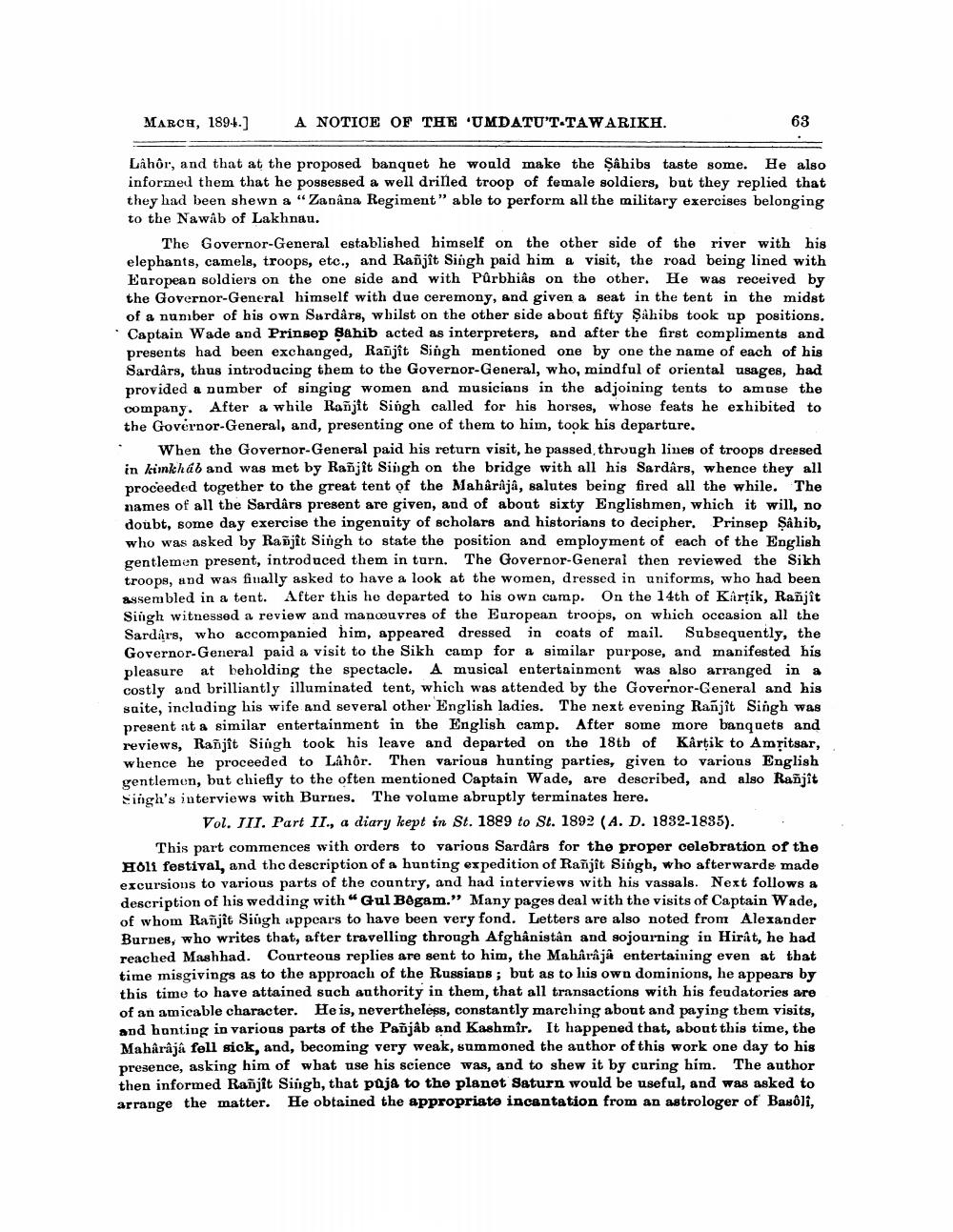________________
MARCH, 1896.)
A NOTICE OF THE 'UMDATU'T-TAWARIKI.
63
Lähôr, and that at the proposed banquet he would make the Şahibs taste some. He also informed them that he possessed a well drilled troop of female soldiers, but they replied that they had been shewn a “Zanana Regiment" able to perform all the military exercises belonging to the Nawab of Lakhnau.
The Governor-General established himself on the other side of the river with his elephants, camels, troops, etc., and Ranjit Singh paid him a visit, the road being lined with European soldiers on the one side and with Purbhiâs on the other. He was received by the Governor-General himself with due ceremony, and given a seat in the tent in the midst of a number of his own Sardars, whilst on the other side about fifty Şahibs took up positions. Captain Wade and Prinsep Sahib acted as interpreters, and after the first compliments and presents had been exchanged, Ranjit Singh mentioned one by one the name of each of his Sardars, thus introducing them to the Governor-General, who, mindful of oriental usages, had provided a number of singing women and musicians in the adjoining tents to amuse the company. After a while Ranjit Singh called for his horses, whose feats he exhibited to the Governor-General, and, presenting one of them to him, took his departure. . When the Governor-General paid his return visit, he passed through lines of troops dreesed in kim cháb and was met by Ranjit Singh on the bridge with all his Sardârs, whence they all proceeded together to the great tent of the Maharaja, salutes being fired all the while. The names of all the Sardârs present are given, and of about sixty Englishmen, which it will, no doubt, some day exercise the ingenuity of scholars and historians to decipher. Prinsep Şahib, who was asked by Rañjit Singh to state the position and employment of each of the English gentlemen present, introduced them in turn. The Governor-General then reviewed the Sikh troops, and was finally asked to have a look at the women, dressed in uniforms, who had been assembled in a tent. After this he departed to his own camp. On the 14th of Karţik, Rañjît Singh witnessed a review and manoeuvres of the European troops, on which occasion all the Sardars, who accompanied him, appeared dressed in coats of mail. Subsequently, the Gorernor-General paid a visit to the Sikh camp for a similar purpose, and manifested his pleasure at beholding the spectacle. A musical entertainment was also arranged in a costly and brilliantly illuminated tent, which was attended by the Governor-General and his saite, including his wife and several other English ladies. The next evening Ranjit Singh was present at a similar entertainment in the English camp. After some more banquets and reviews, Ranjit Singh took his leave and departed on the 18th of Kartik to Amritsar, whence he proceeded to Lähôr. Then various hunting parties, given to various English gentlemen, but chiefly to the often mentioned Captain Wade, are described, and also Rañjit Singh's interviews with Burnes. The volume abruptly terminates here.
Vol. III. Part II., a diary kept in St. 1889 to St. 1892 (A. D. 1832-1835). This part commences with orders to various Sardars for the proper celebration of the Holi festival, and the description of a hunting expedition of Ranjit Singh, who afterwarde made excursions to various parts of the country, and had interviews with his vassals. Next follows a description of his wedding with “Gul Bêgam.” Many pages deal with the visits of Captain Wade, of whom Ranjit Singh appears to have been very fond. Letters are also noted from Alexander Burnes, who writes that, after travelling through Afghanistan and sojourning in Hirât, he had reached Mashhad. Courteous replies are sent to him, the Mahârâ já entertaining even at that time misgivings as to the approach of the Russians; but as to his own dominions, he appears by this time to have attained such anthority in them, that all transactions with his feudatories are of an amicable character. He is, nevertheless, constantly marching about and paying them visits, and hunting in various parts of the Pañjab and Kashmir. It happened that, about this time, the Mahârâjá fell sick, and, becoming very weak, summoned the author of this work one day to his presence, asking him of what use his science was, and to shew it by curing him. The author then informed Ranjit Singh, that puja to the planet Saturn would be useful, and was asked to arrange the matter. He obtained the appropriate incantation from an astrologer of Basoli,




